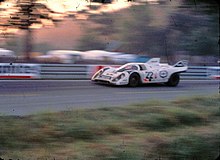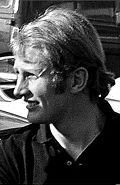Helmut Marko
 Marko in 2016 | |
| Born | 27 April 1943 Graz, Austria |
|---|---|
| Formula One World Championship career | |
| Nationality | |
| Active years | 1971–1972 |
| Teams | BRM, non-works McLaren |
| Entries | 10 (9 starts) |
| Championships | 0 |
| Wins | 0 |
| Podiums | 0 |
| Career points | 0 |
| Pole positions | 0 |
| Fastest laps | 0 |
| First entry | 1971 German Grand Prix |
| Last entry | 1972 French Grand Prix |
Helmut Marko (born 27 April 1943) is an Austrian former professional racing driver and a current director of the Red Bull GmbH Formula One teams, and head of Red Bull's driver development programme.[1]
Biography
Marko was born in Graz, Austria. He was a school friend of Jochen Rindt,[2] who became Formula One world champion in 1970. Marko competed in several race series, including 10 Formula One Grands Prix in 1971 and 1972, but scored no World Championship points.

He had more success in endurance racing, winning the 1971 24 Hours of Le Mans, driving a Martini-Porsche 917K with Gijs van Lennep. During that year, they set a distance record which remained unbeaten until the 2010 24 Hours of Le Mans (5,335.313 km, at an average of 222.304 km/h - changes to the track reduced the average speed.)

At the Targa Florio, he drove the fastest laps around the 72 km Sicilian mountain circuit in the 1972 race, catching up over two minutes on the leader within two laps to finish second by a mere 17 seconds. His fastest lap in the Alfa Romeo 33 was 33 min 41 sec, at an average of 128.253 km/h.[3]
A few weeks later, during the 1972 French Grand Prix at Clermont-Ferrand, a stone thrown up by Ronnie Peterson's March[4][a] pierced Marko's helmet visor, permanently blinding his left eye and ending his racing career.[5][6][7][8]

Marko completed a doctorate in law in 1967.[9] He owns two hotels in Graz – the Schlossberghotel and Augartenhotel. He was manager for Austrian racing drivers Gerhard Berger and Karl Wendlinger for some years before setting up and running RSM Marko in 1989, a race team competing in Formula 3 and Formula 3000; running under the name Red Bull Junior Team from 1999 onwards. From 1999 he has also overseen the Red Bull driver development programme, which has steered drivers such as Sebastian Vettel, Daniel Ricciardo, Carlos Sainz Jr., Pierre Gasly and Max Verstappen into Formula One. Since 2005 he has been advisor to the Red Bull Racing Formula One team and since 2006 he has also advised the Scuderia Toro Rosso, now Scuderia AlphaTauri Formula One team.[citation needed]
Racing record
24 Hours of Le Mans results
| Year | Team | Co-Drivers | Car | Class | Laps | Pos. | Class Pos. |
|---|---|---|---|---|---|---|---|
| 1970 | Porsche 908/2LH | P 3.0 |
335 | 3rd | 1st | ||
| 1971 | Porsche 917K | S 5.0 |
397 | 1st | 1st | ||
| 1972 | Alfa Romeo Tipo 33TT3 | S 3.0 |
232 | DNF | DNF | ||
Source:[10]
| |||||||
Complete British Saloon Car Championship results
(key) (Races in bold indicate pole position; races in italics indicate fastest lap.)
| Year | Team | Car | Class | 1 | 2 | 3 | 4 | 5 | 6 | 7 | 8 | 9 | 10 | 11 | 12 | DC | Pts | Class |
|---|---|---|---|---|---|---|---|---|---|---|---|---|---|---|---|---|---|---|
| 1970 | BMW-Alpina | BMW 1600 | C | BRH | SNE | THR | SIL | CRY | SIL | SIL 7 |
CRO | BRH | OUL | BRH | BRH | 40th | 4 | 14th |
Source:[11]
| ||||||||||||||||||
Complete European Formula Two Championship results
(key)
| Year | Entrant | Chassis | Engine | 1 | 2 | 3 | 4 | 5 | 6 | 7 | 8 | 9 | 10 | 11 | Pos. | Pts |
|---|---|---|---|---|---|---|---|---|---|---|---|---|---|---|---|---|
| 1971 | Ecurie Bonnier | Lola T240 | Ford | HOC Ret |
THR | NÜR 8 |
JAR Ret |
PAL | ROU | 20th | 1 | |||||
| Constructions Mechanique Pygmée | Pygmée MDB16 | MAN Ret |
TUL | ALB | VAL | VAL | ||||||||||
Source:[12]
| ||||||||||||||||
Complete Formula One World Championship results
(key)
| Year | Entrant | Chassis | Engine | 1 | 2 | 3 | 4 | 5 | 6 | 7 | 8 | 9 | 10 | 11 | 12 | WDC | Pts |
|---|---|---|---|---|---|---|---|---|---|---|---|---|---|---|---|---|---|
| 1971 | Ecurie Bonnier | McLaren M7C | Ford Cosworth DFV 3.0 V8 | RSA | ESP | MON | NED | FRA | GBR | GER DNQ |
NC | 0 | |||||
| Yardley-BRM | BRM P153 | BRM P142 3.0 V12 | AUT 11 |
ITA Ret |
CAN 12 |
||||||||||||
| BRM P160 | USA 13 |
||||||||||||||||
| 1972 | Austria-Marlboro BRM |
BRM P153 | BRM P142 3.0 V12 | ARG 10 |
RSA 14 |
ESP | NC | 0 | |||||||||
| BRM P153B | MON 8 |
BEL 10 |
|||||||||||||||
| BRM P160B | FRA Ret |
GBR | GER | AUT | ITA | CAN | USA | ||||||||||
Source:[13]
| |||||||||||||||||
Notes
- ^ Some older sources, such as ESPN (1972), Motor Sport Retro (2013), The Guardian (2014) and Pitpass.com (2018) state that the stone was thrown up by Emerson Fittipaldi's Lotus, but more recent sources, such as GPBlog (2022), First Sportz (2022), The Sports Rush (2023) and PlanetF1 (2023) indicate that it was thrown up by Ronnie Peterson's March.
References
- ^ Delaney, Michael (3 November 2019). "No retirement in sight for the good Dr. Marko". www.f1i.com. Retrieved 20 December 2019.
- ^ Völker, Herbert. "The First Formula One Pop Star". The Red Bulletin September 2010. Red Bull Media House GmbH. Retrieved 25 March 2013.
- ^ 56th Targa Florio 1972, formula2.net, as archived at web.archive.org
- ^ Tripathi, Gunaditya (26 June 2022). "Helmut Marko reminiscences the fatal accident bringing an end to his promising F1 career 50 years ago". firstsportz.com. Retrieved 23 October 2022.
- ^ A Era dos Campeões (DVD). Hangar Filmes.
- ^ Williams, Richard (14 November 2010). "Red Bull's Dr Helmut Marko, the mastermind behind Sebastian Vettel". The Observer. London: Guardian News and Media Limited. Retrieved 13 December 2011.
- ^ "Charade". racingcircuits.info. Retrieved 10 April 2017.
- ^ "The Volcanic Rush of Clermont Ferrand". speedhunters.com. August 2013. Retrieved 10 April 2017.
- ^ Völker, Herbert. "Die Diagnosen des Doktors". Zeit Online. ZEIT ONLINE GmbH. Retrieved 27 June 2013.
- ^ "All Results of Helmut Marko". RacingSportCars. Retrieved 21 October 2019.
- ^ de Jong, Frank. "British Saloon Car Championship". History of Touring Car Racing 1952-1993. Retrieved 23 September 2022.
- ^ "Helmut Marko – Biography". MotorSportMagazine. Retrieved 21 October 2019.
- ^ Small, Steve (1994). The Guinness Complete Grand Prix Who's Who. Guinness. p. 245. ISBN 0851127029.
External links
- 1943 births
- Living people
- Sportspeople from Graz
- 24 Hours of Le Mans drivers
- 24 Hours of Le Mans winning drivers
- Austrian Formula One drivers
- Austrian motorsport people
- Austrian racing drivers
- BRM Formula One drivers
- Ecurie Bonnier Formula One drivers
- European Formula Two Championship drivers
- Red Bull Racing
- World Sportscar Championship drivers
- Scuderia Toro Rosso
- Porsche Motorsports drivers
